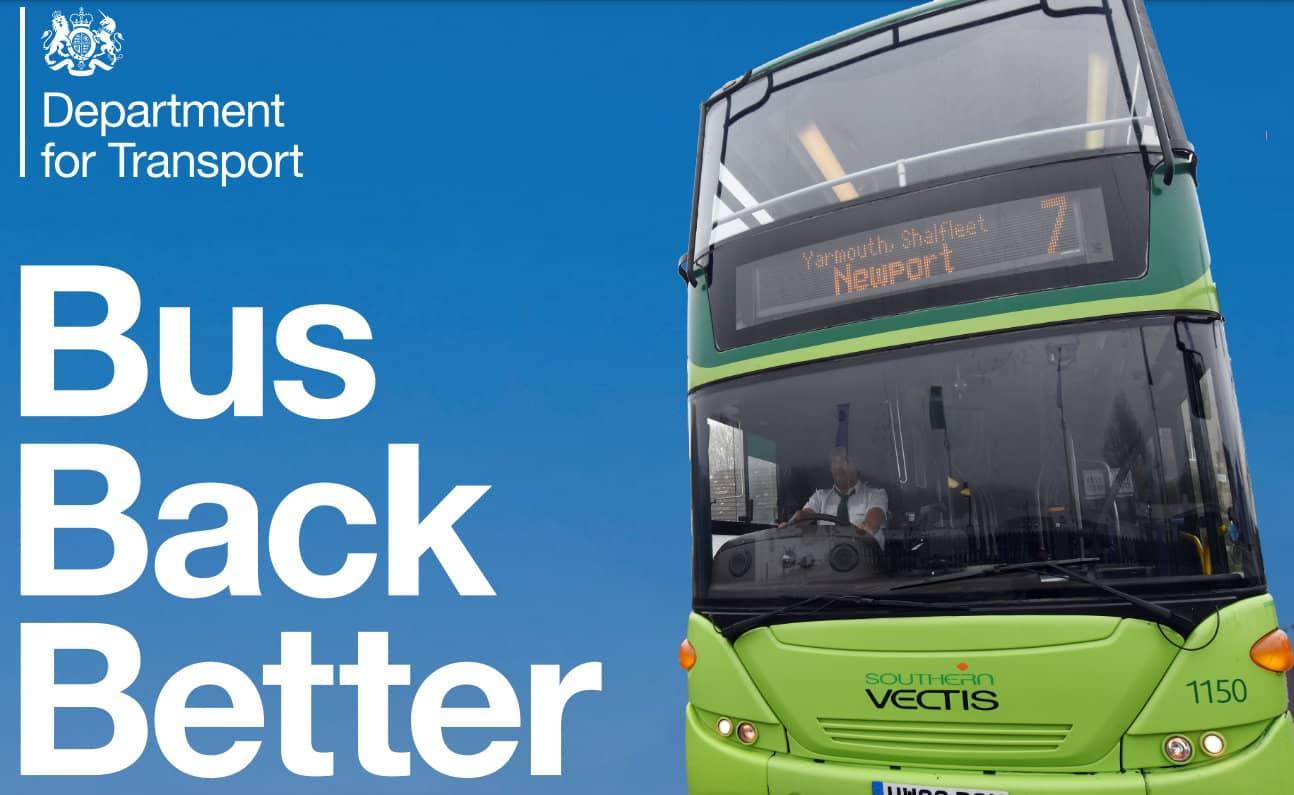The Government wants to change the way things happen with transport across the country.
‘Bus Back Better’ is their catchphrase to cover what might happen differently with buses and other forms of local transport.
The relevance of this to the Isle of Wight? They’re pressuring/encouraging local councils across the country to respond to their call for innovation and change by saying if they don’t respond in time, they’ll miss out on the chance of getting financial support from the taxpayer.
To this end, one of the items the new Isle of Wight council Cabinet will be discussing tomorrow (Wednesday 16th June) will be the Bus Back Better scheme.
How buses should change
The Government have an 86 page document (below) that will give you all detail, but in brief summary, they say their aims are to provide buses that are:
- Cheaper;
- More frequent;
- Faster and more reliable;
- More comprehensive;
- Easier to understand;
- Easier to use;
- Better to ride in;
- Better integrated with other modes and each other;
- Greener;
- Accessible and inclusive by design;
- Innovative;
- Seen as a safe mode of transport
On the cost of bus travel, it’s interesting to see in the Bus Back Better document that across the country, “Average bus fares have risen by 403% since 1987, compared to 325% for rail fares and 163% for motoring costs.” The Government say they want prices brought down.
On-demand service: Bus alternatives
Some parts of the Isle of Wight are less well served by bus routes and all-hours services, which also happens in other parts of the country.
The report says,
“In lower-density areas and at less popular times, conventional fixed-route buses can never compete with the attractiveness or flexibility of the car. But now, aided by technology, demand responsive services can – offering a more personal, on-demand service, taking people from their doors or closer to their doors than a regular bus.”
It will be interesting to see what is proposed by the Isle of Wight council here on the Island, but Southern Vectis are making noises (below) about buses getting higher priority on the Island’s roads.
Bus priority schemes
It sounds like road layouts could see some changes, as, “To benefit from the funding in this strategy, LTAs (Local Transport Authorities) in such places will be expected to implement ambitious bus priority schemes and draw up ambitious Bus Service Improvement Plans”.
Bus priority schemes in cities usually see the buses having their own, dedicated lanes, so they can whoosh around, without being slowed or stopped by traffic jams. It’s currently unclear if this would be considered here.
Collaboration with the bus co
The Government wants local councils (or LTAs) to do this in collaboration with the bus companies. In their words, “Bring together LTAs and their bus operators in every part of England to set out plans to improve local bus services and break the vicious cycle of decline.“
Most LTAs have a deal with one or more bus companies to provide services. As Islanders know, the Isle of Wight has just one, Southern Vectis, (Update: OnTheWight contributor Stuart George has pointed out this is inaccurate, “Not quite true as there’s FYTBus in the West Wight and service 31, which runs between Bonchurch and St.Lawrence via Ventnor and can be found on page 84 of the current Southern Vectis timetable.”) in turn part of the transport giant Go-Ahead Group plc, which runs bus and rail services in United Kingdom, Singapore, Germany, Ireland and Norway.
Southern Vectis’ take
News OnTheWight asked Southern Vectis what their take on all of this was, they promptly responded with the following from Andrew Wickham, managing director of Southern Vectis,
“Now is the right time for a national strategy on buses. This is our chance to embrace green and efficient transport, and further increase the number of passengers travelling with us here on the Isle of Wight.
“If we are to do that, we need to make our buses an even more attractive option – they must be regarded as quick, reliable and convenient.
“For our part, we have invested heavily over recent years to provide one of the country’s most comprehensive bus networks.
“Southern Vectis is among the first local operators to have ‘next stop’ audio/visual on-board announcements, making it far easier for our customers to know exactly where they are on their journeys with us.
“We have also made it easier for people to pay for tickets, introducing contactless payments on all our buses several years ago. All this has led to even higher demand for our services.
“Prior to the Covid 19 pandemic, our services were used extensively by those living on and visiting the island for a wide number of purposes – from commuting and tourism to shopping and social occasions. And, as one of the few operators running services on Christmas Day, we understand how important public transport is in connecting people – as well as towns and villages.
“Even during lockdown, many keyworkers have been relying on us when travelling across the island.
“Now we are looking to the future. Buses are no longer for those who cannot afford a car. They are a serious alternative. A full double-decker bus can take as many as 75 private cars off the road – so our large fleet has an unquestionable opportunity to help change the Isle of Wight’s air quality for the better over the coming years.
“Our own commercial investment has helped build the popularity of public transport here. Now it is time to complement this by continuing to work closely with Isle of Wight Council to give buses higher priority on the island’s roads – and tackle rush hour gridlock.
“Not only do people with easy access to public transport have more chances of getting a job, buses play a vital role in social inclusion, helping to reduce isolation and loneliness. By working in partnership with our local authority, we as a private company can respond to demand effectively, delivering better services for all.”
The full Bus Back Better document
Article edit
6:24pm 16th Jun 2021 – Added Stuart George’s correction





